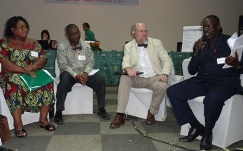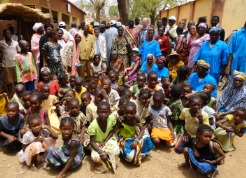Government officials from ministries of agriculture, education and health representing 12 West African countries are to meet in the Gambia from June 4 - 6 for a workshop focused on strengthening school feeding programmes linked to local agricultural production.
Workshop Director and Director of Basic and Secondary Education in the Gambia, Mrs Amicoleh Mbaye said,
"Having the various personalities from 12 different countries come together is a clear manifestation of government commitment to school feeding programme ownership using the multi-sectoral approach".
Home Grown School Feeding - A School Health and Nutrition Intervention

Home Grown School Feeding (HGSF) programmes which link school feeding to agricultural production are one of the school based health and nutrition (SHN) services available to schools helping to promote enrolment, attendance and improve children’s learning abilities.
HGSF programmes also encourage agricultural development and local livelihoods; creating a stable and predictable market for both local smallholder farmers and others involved in the delivery of school meals.
It has become widely recognised that SHN interventions support child health and well-being and encourage children to be fit to learn. In addition to school feeding, these interventions address challenges such as HIV/AIDS prevention, malaria, parasitic worms and nutritional deficiencies – which have hugely negative impacts on child health, education and their achievements later in life.
Mrs Mbaye continued,
"This workshop brings together a diverse range of expertise in the areas of education, agriculture and health, to explore in-depth barriers and subsequent actions required to achieve nationally owned sustainable HGSF programmes linked to the broader school health and nutrition package".
Building on Interest in the West Africa Region

Due to the win-win benefits of HGSF both for farmers and children alike, many low and middle income country governments are striving towards implementing nationally owned, sustainable HGSF programmes.
The workshop builds on this interest in the West Africa region, and is hosted by the Gambian Government, on behalf of the ministries of agriculture, education, health, local government and rural development from countries of the Economic Community of West African States (ECOWAS), with support provided by the World Bank and the Partnership for Child Development (PCD).
Key school feeding and SHN programming stakeholders representing countries: Ghana, Nigeria, Burkina Faso, Guinea, Cote D’Ivoire, Togo, Cape Verde, Sierra Leone, Liberia, Mali and Senegal will at the workshop, learn from discussions centred on good practice in SHN interventions, and ways to strengthen school feeding linkages with agriculture.
Country teams will also have the chance to share experiences, network across teams and learning will be put into action as countries work on HGSF programme action plans.
"During the workshop, programme implementers and policy makers will be able to share their successes, challenges and overall experiences from diverse perspectives," said PCD’s West Africa Regional Coordinator, Daniel Mumuni.
He continued,
"Local ministries will also be able to discuss effective ways of bringing their comparative advantages to programme implementation. In the end, Government capacity and leadership to effectively manage HGSF is imperative, and the workshop further enhances this process". 
